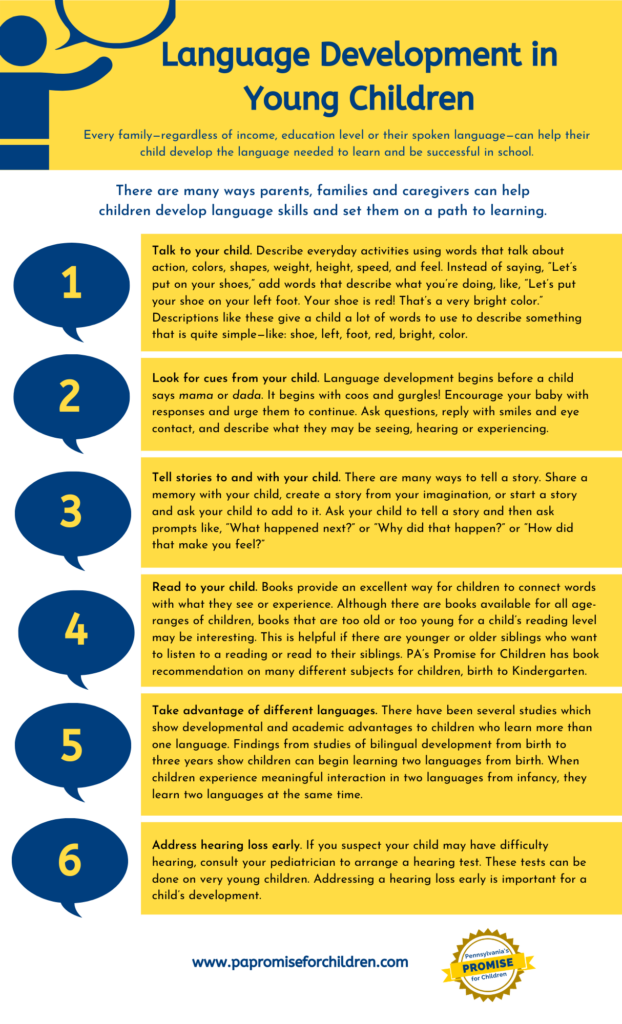Click here to download or print in English.
Click here to download or print in Spanish.
(Prints on 8.5 x 14 inch legal size paper.)


A language development delay can impact how a child learns, not only while young but also as they age.
Regardless of income, education level, or spoken language, every family can help their child develop the language needed to learn and succeed in school.
A child’s language development begins at birth, long before they can say or even understand words’ meaning. Their language development relies on parents, families, and caregivers to provide the necessary tools and experiences that encourage what words they learn, how they use, and how they communicate.
There are many ways parents, families, and caregivers can help children develop language skills and set them on a learning path.
- Talk to your child. Describe everyday activities using words about action, colors, shapes, weight, height, speed, and feel. Instead of saying, “Let’s put on your shoes,” add words that describe what you’re doing, like, “Let’s put your shoe on your left foot. Your shoe is red! That’s a very bright color.” Descriptions like these give a child a lot of words to use to describe something quite simple—like shoe, left, foot, red, bright, color.
- Look for cues from your child. Language development begins before a child says mama or dada. It starts with coos and gurgles! Encourage your baby with responses and urge them to continue. Ask questions, reply with smiles and eye contact, and describe what they may be seeing, hearing, or experiencing.
- Tell stories to and with your child. There are many ways to tell a story. Share a memory with your child, create a story from your imagination, or start a story and ask your child to add to it. Ask your child to tell a story and then ask prompts like, “What happened next?” or “Why did that happen?” or “How did that make you feel?”
- Read to your child. Books provide an excellent way for children to connect words with what they see or experience. Although books are available for all age ranges of children, books that are too old or too young for a child’s reading level may be interesting. This is helpful if younger or older siblings want to listen to a reading or read to their siblings. PA’s Promise for Children has book recommendations on many different subjects for children from birth to Kindergarten.
- Take advantage of different languages. Several studies show developmental and academic benefits to children learning multiple languages. Findings from studies of bilingual development from birth to three years show children can begin learning two languages from birth. Children who experience meaningful interaction in two languages from infancy learn two languages simultaneously.
- Address hearing loss early. If you suspect your child may have difficulty hearing, consult your pediatrician to arrange a hearing test. These tests can be done on very young children. Addressing a hearing loss early is important for a child’s development.
Resources:
Learning is Everywhere (PA’s Promise for Children): Everyday early learning activities that align with the Pennsylvania Early Learning Standard, including language, to help your child learn and grow.
Speech and Language Developmental Milestones (National Institute on Deafness and Other Communication Disorders): Baby’s hearing and communicative development checklist
Typical Speech and Language Development (American Speech-Language-Hearing Association): Articles on speech, language, how your child hears and talks, early identification of speech, language and hearing disorders and more.
10 Ways to Promote the Language and Communication Skills of Infants and Toddlers (Frank Porter Graham Child Development Institute)
Development of lnfants and Toddlers Who Are Dual Language Learners (Center for Early Care and Education Research)
Out of the mouth of babes (Knowable Magazine, Feb. 13, 2020): Learning a language is child’s play, but linguists are still trying to understand how children do it so easily.
